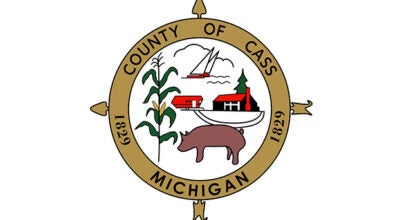Environmental assurance program verifies local farms
Published 10:44 am Monday, July 10, 2017
The Michigan Department of Agriculture and Rural Development’s Michigan Agriculture Environmental Assurance Program is recognizing six farms in Cass County for implementing appropriate pollution prevention practices.
The program assists farmers in complying with state and federal environmental regulations and with Right to Farm practices. Technical assistance was provided by the Cass Conservation District.
The Michigan Agriculture Environmental Assurance Program recognized:
• White Tail Acres, of Edwardsburg, as a verified farm in farmstead, cropping and livestock systems
• James E. Green Farm, of Vandalia, as a verified farm in farmstead and cropping systems
• Pat Stevens Farm, of Cassopolis, as a verified farm in the farmstead system
• Thomas Bennett Farms, of Edwardsburg, as a verified farm in farmstead, cropping, and livestock systems
• Stutsman Farm, of Edwardsburg, as a verified farm in the farmstead system
• Maple Row Sugar House, of Jones, as a verified farm in the farmstead system
“By taking the steps necessary to become an environmentally verified operation, these Cass County farms have contributed to the assurance of sustainable farming practices,” said MDARD Director Jamie Clover Adams. “Michigan is leading the national agriculture community in effective stewardship practices with the voluntary, incentive-based MAEAP program. The continued success of the program demonstrates that environmental sustainability and economic development are not mutually exclusive.”
MAEAP is a collaborative effort of farmers, MDARD, Michigan Farm Bureau, commodity organizations, universities, conservation districts, conservation and environmental groups and state and federal agencies.
More than 100 local coordinators and technical service providers are available to assist farmers as they move through the MAEAP process toward verification. An average of 8,000 Michigan farmers attend educational programs annually, 10,000 Michigan farms have started the verification process and more than 4,000 farms have been verified to date.
To become MAEAP verified, farmers must complete three comprehensive steps that include attending an educational seminar, conducting a thorough on-farm risk assessment, and developing and implementing an action plan addressing potential environmental risks. MDARD conducts an on farm inspection to verify program requirements related to applicable state and federal environmental regulations, Michigan Right to Farm guidelines, and adherence to an action plan.
When completed, the producer receives a certificate of environmental assurance. To remain a MAEAP verified farm, inspections must be conducted every five years and action steps must be followed.
MAEAP is a multi-year program allowing producers to meet personal objectives, while best managing both time and resources. The program encompasses four systems designed to help producers evaluate the environmental risks of their operation. Each system — livestock, farmstead, cropping, and forest, wetlands, and habitat — examines a different aspect of a farm, as each has a different environmental impact. By participating in all four systems, producers can comprehensively evaluate their entire farming operation for potential environmental risks.
For more information, visit the MAEAP website at maeap.org, contact your local conservation district, or contact Joe Kelpinski, MDARD’s MAEAP Program Manager, at (517) 284-5608.





